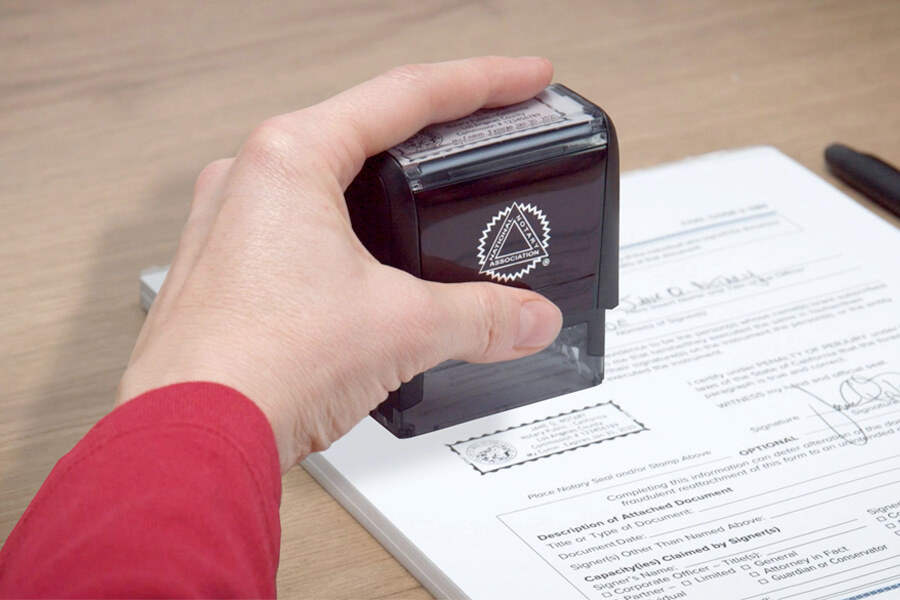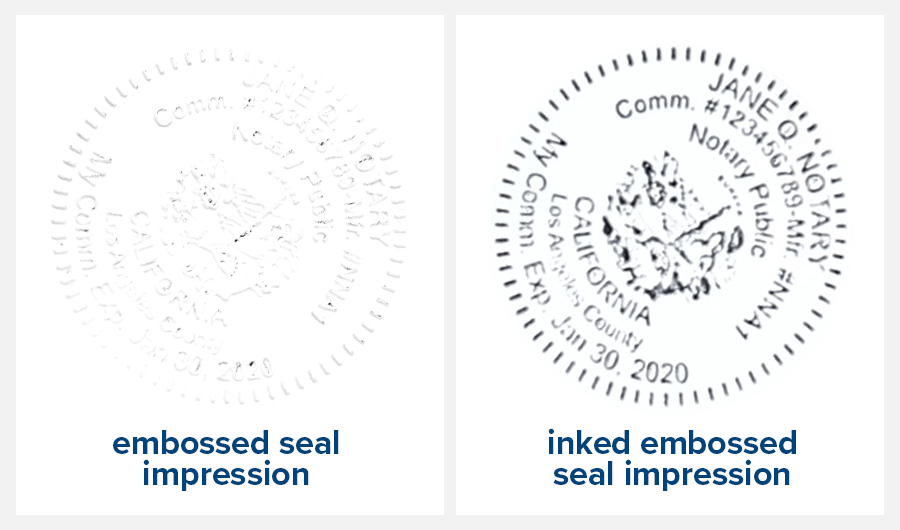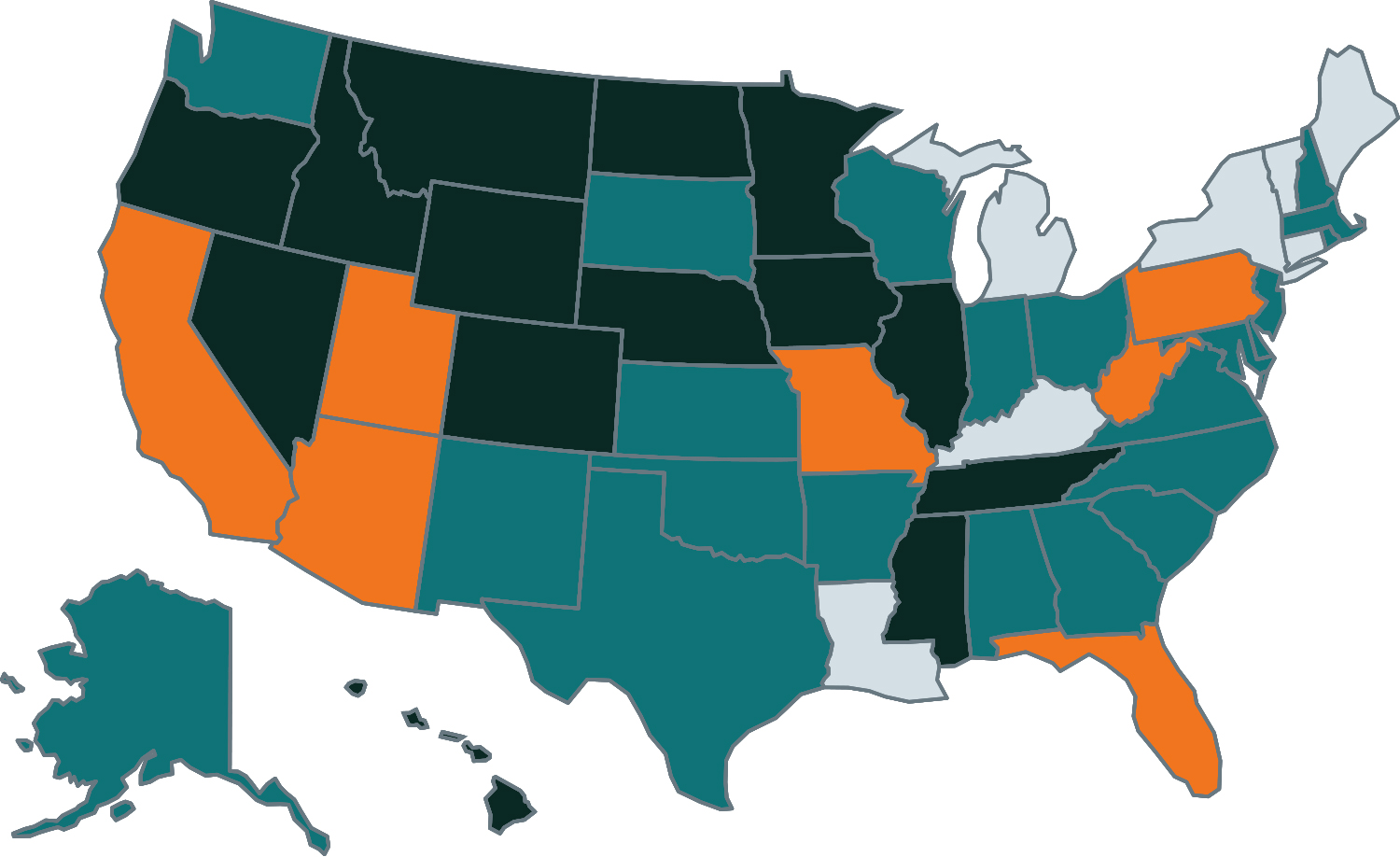Updated 9-9-24. Almost every state requires Notaries to use an official seal when notarizing physical documents. Traditional seals typically come in two formats — ink stamps and embossers. Here’s the difference between ink stamps and embossers and each state’s requirements for the seal you may use.

Notary ink stamps
Ink stamps are the most commonly used type of Notary seal. These rubber Notary stamps leave an inked imprint with Notary information, such as the Notary’s name, commissioning state or date of commission expiration.
The shape, size, and information of the official seal imprint depend on the laws of the Notary’s commissioning state.
Notary embossers
Embossers are metal clamping devices. Instead of leaving an ink imprint, a Notary embosser “crimps” a document, creating a raised physical impression displaying Notary information on the paper.

While visible to the naked eye, the impression made by an embosser won’t be visible on a photocopy unless ink or another method like colored foil is added. Many states that allow Notaries to use an embosser also require making the embossed impression photographically reproducible.
As with ink stamps, the shape, size and information needed for an embosser depends on the laws in the Notary’s commissioning state.
What about electronic Notary seals?
Notarizing electronic documents may require an official electronic seal, which uses technology very different from traditional physical ink stamps and embossers. To find out more about electronic Notary seals and the forms they can take, please read “Understanding Notary technology: eSeals, eSignatures and digital certificates.”
Which type of Notary seal can I use?
Each state has rules for what type of official seal Notaries must use. Some require ink stamps, some allow using either an embosser or an ink stamp, and a few even make use of an official seal optional.
Below, we’ve provided a chart listing traditional Notary seal requirements for each state and the District of Columbia.
Traditional Notary seal requirements for U.S. states and D.C.

States allowing ink stamp or embosser
States requiring ink stamp, additional embosser optional
No ink stamp or embosser requirement
Discover the Notary seal requirements for your state
Alabama
Ink stamp or embosser
(COA 36-20-72)
Alaska
Ink stamp or embosser
Embosser must be photographically reproducible. (AS 44.50.065[a])
Arizona
Ink stamp required. Additional embosser optional.
(ARS 41-266.2; ARS 41-267.C)
Arkansas
Ink stamp or embosser
Embosser must be photographically reproducible. Notary must use blue or black ink for either type of seal. (ACA 21-14-107[b][1])
California
Ink stamp required. Additional embosser optional.
Notaries may use embosser seal in addition to ink stamp. All seals must be photographically reproducible. (GC 8207)
Colorado
Ink Stamp only
(CRS 24-21-517[1][b])
Connecticut
No ink stamp or embosser requirement
Delaware
Ink stamp or embosser
Official stamp must be photocopiable. (29 DC 4316[13]; 29 DC 4330[2])
District of Columbia
Ink stamp or embosser
Official seal must be photocopiable using permanent ink. (CDC 1-1231.1[11]; 17 DCMR 2404.6)
Florida
Ink stamp required. Additional embosser optional.
Black, photographically reproducible ink required for an ink stamp. (FS 117.05[3][a]; FS 117.05[3][a])
Georgia
Ink stamp or embosser
(OCGA 45-17-6[a][1])
Hawaii
Ink Stamp only
(HRS 456-3)
Idaho
Ink Stamp only
(IC 51-117[1])
Illinois
Ink Stamp only
(5 ILCS 312/3-101[a])
Indiana
Ink stamp or embosser
Notary’s name on official seal must be photocopiable. (IC 33-42-05-1[13])
Iowa
Ink Stamp only
(IC 9B.17.1.b)
Kansas
Ink stamp or embosser
Official stamp must be photocopiable. (KSA 53-5a18[a])
Kentucky
No ink stamp or embosser requirement
If Notary chooses to use a stamp, it must be photocopiable. (KRS 423.370; KRS 423.370[2])
Louisiana
No ink stamp or embosser requirement
(LAC 46:XLVI.131.A; see Flemming v. Richardson & Smith, 13 La. Ann. 414 [1858])
Maine
No ink stamp or embosser requirement
Ink stamp or embosser optional for physical documents. (4 MRSA 1916.2)
Maryland
Ink stamp or embosser
Official stamp must be photocopiable. (ACM St. Gov’t 18-215[b][1]; ACM St. Gov’t 18-217[a][2])
Massachusetts
Ink stamp or embosser
Ink stamp must use black ink. (GL 222, Sec. 8[b]; GL 222, Sec. 8[b])
Michigan
No ink stamp or embosser requirement
(MCL 55.287[2])
Minnesota
Ink Stamp only
(MS 358.67)
Mississippi
Ink Stamp only
(MCA 25-34-33[1][b]; 1 Miss. Admin. Code Pt. 5, R. 050.3.20[B])
Missouri
Ink stamp required. Additional embosser optional.
Black ink required for ink stamp. (RSMo 486.730.1; RSMo 486.730.3; Missouri Notary Handbook)
Montana
Ink Stamp only
Stamp must use blue or black ink. (MCA 1-5-616[2][b]; ARM 44.15.107[1][b])
Nebraska
Ink Stamp only
(RSN 64-210)
Nevada
Ink Stamp only
Must use “rubber or mechanical stamp” (ink stamp) that uses photographically reproducible ink. (NRS 240.040.1[a])
New Hampshire
Ink stamp or embosser
Official stamp must be photocopiable. (RSA 455:3.II; RSA 456-B:8-a.I(b))
New Jersey
Ink stamp or embosser
Official stamp must be photocopiable. (NJSA 52:7-10.5.a)
New Mexico
Ink stamp or embosser
Official stamp must be photocopiable. (NMSA 14-14A-16.B; NAC 12.9.3.14.C[2])
New York
No ink stamp or embosser requirement
(Notary Public License Law publication)
North Carolina
Ink stamp or embosser
(GS 10B-3[23])
North Dakota
Ink Stamp only
(NDCC 44-06.1-01.12; NDCC 44-061-01.8)
Ohio
Ink stamp or embosser
(ORC 147.04)
Oklahoma
Ink stamp or embosser
(49 OS 5.A; OAC 655:25-5-2[b])
Oregon
Ink Stamp only
Black or dark blue ink recommended. (ORS 194.290[2])
Pennsylvania
Ink stamp required. Additional embosser optional.
(57 Pa.C.S. 317[1]; 4 Pa. Code 167.23[a])
Rhode Island
Ink stamp or embosser
Embosser must be photocopiable or able to scan. (State Notary Public Manual)
South Carolina
Ink stamp or embosser
(SCC 26-1-5[18])
South Dakota
Ink stamp or embosser
(SDCL 18-1-3.1)
Tennessee
Ink Stamp only
Ink must be any photocopiable color except black or yellow. (TCA 8-16- 114[a])
Texas
Ink stamp or embosser
Seal must be photographically reproducible. (GC 406.013[c])
Utah
Ink stamp required. Additional embosser optional.
Photographically reproducible ink required for ink stamp. (UCA 46-1-16[3][b]; UCA 46-1-16[4])
Vermont
No ink stamp or embosser requirement
If the Notary chooses to use a stamp or embosser, it must be photocopiable. (26 VSA 5370)
Virginia
Ink stamp or embosser
Seal image must be photographically reproducible. (COV 47.1-16[C])
Washington
Ink stamp or embosser
Seal or stamp must be photocopiable. (RCW 42.45.010[16]; RCW 42.45.150[3])
West Virginia
Ink stamp required. Additional embosser optional.
Photocopiable ink required for ink stamp. (WVC 39-4-17[2]; Secretary of State’s website)
Wisconsin
Ink stamp or embosser
Official stamp must be photocopiable. Attorney-Notaries are not required to use a seal. (WS 140.02[3][a]; WS 140.17[2]; “Instructions for Wisconsin Attorneys’ Permanent Notary Public Application”)
Wyoming
Ink Stamp only
Must use blue or black photocopiable ink. (WS 32-3-116[a][ii][E])
David Thun is the Editorial Manager at the National Notary Association.
Related Articles:
Would you like more information about Notary ink stamps and embossers and how to purchase one? Please visit “Everything You Need to Know About Your Notary Seal Stamp or Seal Embosser.”